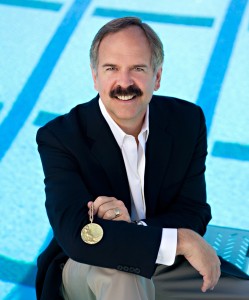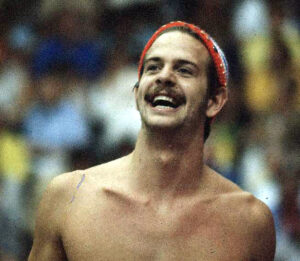By Mark Ellis —
As an Olympic swimmer on the U.S. team, he won four gold medals and set as many world records at the 1976 games in Montreal. His relaxed demeanor in high-pressure competition set him apart from other athletes – all because of an unseen presence that profoundly altered his focus before races.

“I like the water; I’m comfortable there,” says John Naber, sports broadcaster, author, and motivational speaker.
His father was a management consultant who moved frequently, so in John’s first 12 years he lived in six different houses. He also spent seven years in Europe, which led to a summer tour of Olympia, Greece, the site of the ancient competition.
The family’s tour guide at Olympia explained the importance of sportsmanship in the early games and noted the ancients even built a Hall of Shame for cheaters in their events. Impressed by this, 10-year-old John turned to his mother and said, “I want to be an Olympian one day.”
“What sport?” his mother asked, knowing he hadn’t demonstrated any hint of future greatness.
“I have no idea,” the youngster replied.
As a freshman at Woodside High School near Stanford University, Naber befriended a swimmer who won a silver medal in the Junior Olympics. Inspired by his new friend, Naber decided to join the swim team.
“I jumped in the pool and found myself swimming laps,” he recalls. “I was cramping up but I enjoyed the process of racing the clock.” Naber didn’t win a race in his first two years of competition, but the stopwatch looked better and better with each passing month.
By his junior year, Naber was the best swimmer on the team and he had even begun to entertain the idea of trying out for the 1972 Olympic team, but a serious setback derailed his plans. As he clowned with friends, he broke his collarbone after a springboard launched him into the side of the pool, while trying to avoid a lane rope as tight as a guitar string.
“My season came to an abrupt halt,” Naber says. He soon became restless with the forced inactivity. “If you train four hours a day and stop, you have lots of energy and I didn’t know what to do with it.”
He shifted his focus from the water, ran for student body president and won. One of his new responsibilities as president was to introduce guest speakers who visited the campus. One of those guest speakers was Rick Carreno, an evangelist affiliated with Billy Graham’s organization.
At this point in his life, Naber had no interest in the message or the messenger. “It’s awkward to introduce a speaker and then disappear,” he thought, so he sat and listened to Carreno.
The speaker described his troubled past, filled with drugs and dangerous living. As Naber sat there, he thought: “I can’t relate to this guy.” Naber was a model of student achievement who didn’t partake in drinking or drugs. He was a straight arrow who didn’t miss the mark very often.
At the end of the talk, Carreno issued a challenge. “If you go home and invite Christ into your heart and it’s all a lie, what’s the downside?” he asked. “If Jesus is not real and nothing happens, at least you’ve eliminated one alternative.”
Naber couldn’t argue with this logic. That night, in the privacy of his bedroom, he offered his life to Jesus Christ. In the morning, something was noticeably different.
“A white dove didn’t fly through the window and settle on my forehead,” Naber says. “But I woke up with a sense of peace and calm and purpose. I felt instant unconditional love and I felt much more at home in my own skin.”
Always the dutiful son, most of his life he had tried to satisfy his parents and others. “Instead of trying to please others, I decided I could please just one – God.”
Suddenly he had the desire for fellowship with other believers and he got involved with Young Life. “Outwardly, not that much had changed, but inwardly, everything changed,” he notes. “A missing piece of the puzzle locked into place.”
Even though Naber didn’t make the Olympic team in 1972, he began to set his sights on the next games. “I set specific goals of how fast I thought I would have to swim the backstroke in 1976 to win the gold.”
Everything came together for Naber in Montreal, where he became America’s most decorated Olympian in the 1976 games. He also became the first swimmer in history to earn two individual medals on the same day of Olympic competition.
Commentators who covered swimming noticed something that set Naber apart from other competitors. “In my sport athletes have a

reputation for being totally focused on the starting blocks,” he says. “They try to psyche out the competition.”
Some put ear buds in their ears, move about with their heads down, refusing to make eye contact. But not Naber. He was laughing and joking with others, having the time of his life.
“If you go back and read the clippings, people were amazed I was so cavalier on the pool deck before the gold medal finals,” he says. “I knew I was unconditionally loved by God so my results in the pool had no bearing on whether or not God loved me. I was extremely comfortable in my own skin.”

This inner assurance that results from God’s presence in his life also makes a difference when he gives motivational speeches to corporations and other groups today.
“The two psychological factors that affect athletic performance are incentive and pressure,” he notes. “Too little incentive and too much pressure are bad things,” he says. “A lot of incentive and very little pressure is an ideal athletic state.”
“When you want to honor God through your performance there is great incentive,” he says. “When you have God’s unconditional love, there is no pressure.”
If you want to know God personally, go here




“I knew I was unconditionally loved by God so my results in the pool had no bearing on whether or not God loved me.” I remember when I realized that in my own life, it changed everything! I was shy, moody and introverted….I’m no longer any of those things because I know I’m the daughter of the King
It is so wonderful to see, years later, how God uses anyone who is willing to guide people to Himself. I only became aware of Mark’s coming to Christ through my testimony in the last few minutes and yet God has been using him since 1976 to lead, who knows, how many others to Christ. This is a perfect example of “why” you should “never” pass up an opportunity to share how much Jesus means to you! Just imagine the lives that have been rewarded as Billy shared with me, I with Mark and Mark with others who went on to pass on their faith to untold numbers of others. God is so great, isn’t He?
Keep telling others and, who knows, how The Lord might use you….
Comments are closed.